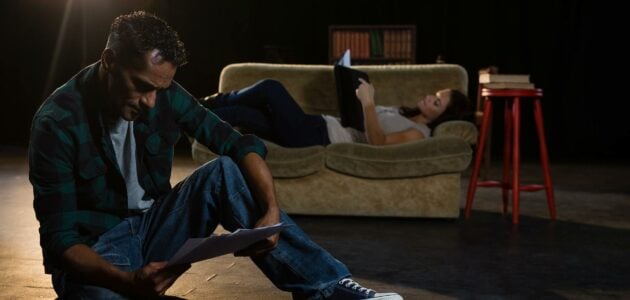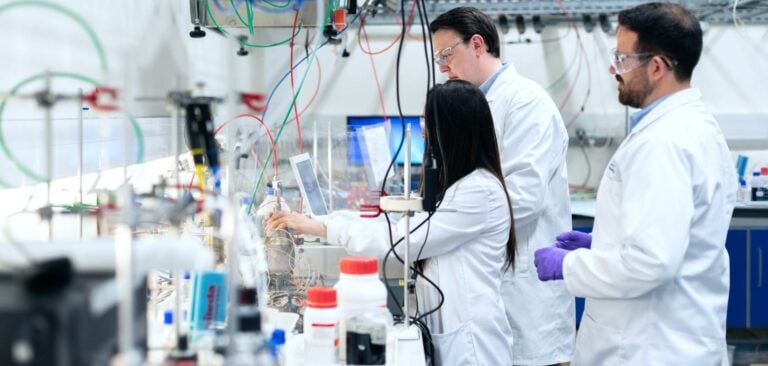
How to Break Down a Scene for Acting
“Learn the lines and don’t bump into the furniture.” We’ve all heard the quote, and yet we all know how untrue it is. Saying the lines without any motivation behind them leads to uninspired work and a lack of storytelling. In an audition context, it can be an absolute killer that costs you the job—no matter how perfect you might be for the role! So how do you keep your work focused, your work motivated and your acting inspired? A lot of it comes down to how you analyse and interpret a scene. In this article, we are going to look at how to break down a script and to get the most out of a scene whether it’s for stage or screen.
Breaking down a scene can be a long, drawn-out process that invites extensive script analysis. In situations where you don’t necessarily have the resources to do a full deep-dive (especially when the sides you’ve been sent for an audition give you little-to-no-context), there are certain rules you can follow that will help you get the most out of the words on the page. This, in turn, will allow you to deliver more as your character whilst making do with less.
As we are somewhat looking at the cliff notes of our larger exploration of this topic, we’re going to suggest you read our primary article on script analysis: how to get the most out of a script. This should give you a strong indicator of the kind of work you can do with enough time and preparation.
Why Scene Analysis Important to your Acting
How is it that some movies can fly by in a heartbeat but have run for two hours? What is it that makes that tacky ensemble rom-com drag for an eternity, or that dry legal drama blitz past you with nothing more than a bunch of lawyers talking in wood-panelled rooms? It’s a lot to do with the way individual scenes break down. There is an unwritten rule of script writing that a scene must always earn its spot in the plot. Unless it is absolutely necessary, it needs to be cut. What makes a scene necessary is one of three things:
- Character progression: when a character learns, grows or changes due to interactions with others or the workings of the plot.
- Plot progression: when the story itself is moved along either by character action, inaction or an external influence (such as a looming election, blackout, robbery, asteroid, etc.)
- Exposition: information that contributes to a character’s (read: the audience’s) understanding of the plot or its setting.
Usually, a scene will incorporate more than one of these things. A great scene will almost definitely do this, or at least feature one of the above points in an interesting way. Exposition, for example, is often seen as something that often sticks out as clunky and stops the story at hand dead in its tracks. In the hands of a master like Steven Spielberg, however, a scene of exposition can be some of the most gripping material in the movie:
In short, your first job when looking over a scene to break down is to work out what kind of scene it is. Is it a moment of introspection, a memory recalled? A fast exchange between two characters where their tensions bubble over? A break-up between two partners who have finally had enough of living in the past? Where does the scene fit into the above categories? More importantly, which two-or-more categories does it sit across?
Identify Character Progression
Start here. Usually, scenes you’ll be assigned for an audition will incorporate some form of character progression. This is because the focus of a casting director is to see what you can bring to the character, rather than if you look like you can believably disarm a bomb or catch a criminal (don’t worry, they’ll train you up for those parts.) The key to making a such a scene work having your character begin in one state and end in another. This illustrates you know how the character is changing and growing, and can identify why the scene exists in the first place.
Ask yourself what changes for my character in this scene? Your character might learn a new piece of information, realise a personal flaw, or solve a problem. They might fall out of love, declare their feelings or end a relationship. Family secrets, detective cases that have a eureka moment, proposals, anything that drags your character between dizzying emotional highs and crushing emotional lows. Win or lose for your character, whatever happens to them/because of them has to change them. Even if they supress it or deny it outright.
For any given scene, try to identify the change of state for the character; for example:
“Molly begins the scene flailing, looking for legal representation, but ends with a measure of confidence having secured a lawyer to defend her.”
This will also help you find your character’s objective in a scene, and give you ideas on how best to pursue it with actions.
Identify Plot Progression
Next, try to determine the source of conflict in the scene: the obstacle and/or goal that is putting your character through this change. Remember: characters are not what they feel, they’re what they do. There is nothing more telling than an actor who gets angry because “this is the part when I’m meant to yell.” Why are you yelling? Because the writer said you should ? Don’t trust them—have you ever met one?!
Map out your plot by breaking the scene down into beats: the chunks of action separated by moments of internal change or external force. Your character’s speaking to their partner who reveals an affair? Beat change? Your character’s speaking to their partner and the FBI kicks down the door? Beat change. For each beat, identify the practical actions. Don’t use actioning, intentions or justifications at this point. Explain what happens in the least creative way possible. Once you have the plot, you can step back and see how your character reacts to these external forces. More often than not, the most entertaining choices come when an actor allows the plot to happen around their performance, rather than intentionally driving the plot.
Plot is important, but it’s not everything. This is especially true in auditions, when you often don’t have the larger narrative to guide you to a super-objective or an overall guiding arc. Let go of end-gaming your story and focus on your short term objectives. What do you want from your scene partner in this given (scene) moment? Pursue that and keep yourself present. As actors, it is natural to want to assume responsibility for more than our role. Sure, the look, the feel, and the direction of the scene relies on an actor’s performance, but at the end of the day, the writers might cut your scene or shuffle something in the edit that changes the whole story. With this in mind, one way to improve your scenes is to let go of your responsibility to the plot.
The bottom line? The plot will happen inevitably whether you focus on it or not. Affect your fellow actors, and let the plot fall into place.
On Exposition
The trickiest beast. Exposition-heavy scenes are often dramatically barren, with on-the-nose dialogue designed to bring the audience up to speed with background information. However, as we’ve seen with ol’ Quint above (and if you haven’t seen it, stop reading now and go watch Jaws), exposition can be an exciting opportunity for an actor to play with a wealth of—admittedly, sometimes banal—dialogue. Boring? Sometimes. But think of it more as a challenge!
Find a reason why your character wants to divulge this information. It can be tempting to act out the story you are telling rather than acting the reasons your character has for telling it. Action the script accordingly. And rather than inserting emotional responses in, really ask how your character feels about the current moment. How is their scene partner reacting to the information? Is it affecting them, upsetting them, inspiring them? And how does that play back to you?
Too often, when delivering monologues, we forget that a scene with one-sided dialogue is still communication. Just because your scene partner isn’t speaking doesn’t mean you’re not getting a response from them. Check in with them for the ‘tells’ in their body language: expression, action, physicality, whether or not they’ve started smashing the furniture as you talk.
Y’see, the dirty secret with exposition is it’s actually primed for character progression: emotional state change and sources of conflict. Always ask yourself why you are motivated to explain this information, and how that changes your character. Most of the scripts on soap operas like Home and Away are filled with exposition, due to the large cast of characters and fast moving plots. The audience needs to be able to catch onto the action even if they tune in halfway through an episode. Learning how to deliver exposition with purpose is an invaluable skill that will earn your character their moment to dramatically shine. Take a look at the below clip from Saving Private Ryan, where actor Leland Orser, King of the Creepy 90s Exposition Monologue, stops an epic dead in its tracks to grip the audience’s hearts…
Respect the Text
Ultimately, to break down a scene for acting is to know and respect the words on the page. Even if your contextual knowledge is crap at best, and the writer has (mercifully) given you very little in the way of lengthy character descriptions, they’ll still have left plenty of breadcrumbs for you to follow. In an audition, or on day one of filming or rehearsals, a director won’t necessarily be looking for you to have the exact take on how a scene should be broken down. If that were the case, they’d be out of a job! But they are looking for your opinion, and to see that you know and respect the process of breaking down a script.
So practice this skill. Give it time and consideration: it is one of those great acting skills you can perfect on the train ride home at zero financial cost! And let your deepening understanding of how a scene works and what makes it important inform your next big audition. It is the perfect way to give you an edge over the rest!


Leave a Reply